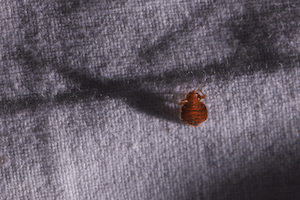Up until relatively recently, Michigan and most of the rest of the US were almost entirely bed bug-free. Unfortunately, that’s no longer the case. All of a sudden, the beauty sleep-wreckers re-emerged, hardier–and hungrier!–than ever. In just a few short years, bed bugs proliferated all over the US and reclaimed their status as major pests.
Unfortunately, Michigan was not spared from the bed bug’s resurgence. In fact, we got hit worse than most of the rest of the US! If we’re going to combat the new bed bug menace infiltrating our state, we have to get organized. That’s why Griffin put together this bed bug situation report for residents of Michigan and the rest of the Midwest. This is everything you need to know about why bed bugs are back and why they’re a problem.
How Bad It Is
 As of 2015, 99.6% of all pest control companies in the US reported treating bed bug infestations. 95% of the pest professionals who treated for bed bugs reported infestations in apartments and condos. According to the same report, 1 in 5 Americans have either encountered bed bugs themselves or know someone who has. In 2013, Americans spent around $446 million treating bed bug infestations.
As of 2015, 99.6% of all pest control companies in the US reported treating bed bug infestations. 95% of the pest professionals who treated for bed bugs reported infestations in apartments and condos. According to the same report, 1 in 5 Americans have either encountered bed bugs themselves or know someone who has. In 2013, Americans spent around $446 million treating bed bug infestations.
Michigan’s bed bug problem is particularly severe. As of 2017, 605 bed bug infestations have been reported in commercial properties in Michigan on The Bedbug Registry. Detroit ranked #3 on a 2017 list of the top 50 worst cities for bed bugs in the US. In a different 2015 report, Grand Rapids, Kalamazoo, Battle Creek, and Detroit all ranked in the top 20. Griffin gets calls about residential and commercial bed bug infestations almost every single day.
Why They’re Back
 There are a couple theories about why bed bugs are back with a vengeance after their prolonged absence. Most disturbingly, recent studies show that bed bugs have developed resistances to the pesticides commonly used to control them. Resisting these common chemicals means bed bugs survive in much greater numbers, even in controlled environments. The more bed bugs survive, the more they grow, reproduce, and spread out.
There are a couple theories about why bed bugs are back with a vengeance after their prolonged absence. Most disturbingly, recent studies show that bed bugs have developed resistances to the pesticides commonly used to control them. Resisting these common chemicals means bed bugs survive in much greater numbers, even in controlled environments. The more bed bugs survive, the more they grow, reproduce, and spread out.
Unfortunately, this rapid expansion is facilitated by our commuter and travel-based society. Bed bugs are consummate hitchhikers. Travelers inadvertently transport them from place to place on bags, luggage, clothing, and other commonly transported items. Finally, because they hadn’t been a problem for so long, the public doesn’t quite know how to handle them. Most of the thousands of bed bed infestations that occur every year could have been prevented relatively easily. When it comes to fighting the bed bug menace, knowing is more than half the battle!
Where They Came From
 Alright, we’re not going to try to pass the blame onto someone else. The fact of the matter is, bed bugs are everyone’s responsibility. Buuuut… Ok, remember how Detroit was #3 on the list of worst cities for bed bugs? Well, Ohio cities Cleveland and Cincinnati ranked at #1 and #2, respectively. As major urban centers, thousands of people travel between each of these three cities every single day. They bring all their cargo and luggage with them–and often, their bed bugs, too!
Alright, we’re not going to try to pass the blame onto someone else. The fact of the matter is, bed bugs are everyone’s responsibility. Buuuut… Ok, remember how Detroit was #3 on the list of worst cities for bed bugs? Well, Ohio cities Cleveland and Cincinnati ranked at #1 and #2, respectively. As major urban centers, thousands of people travel between each of these three cities every single day. They bring all their cargo and luggage with them–and often, their bed bugs, too!
Like we said above, the number one way bed bugs spread is by hitchhiking with travelers. Bed bugs smuggle themselves from place-to-place on cargo and luggage. When they reach a new destination, they spread out in search of food and hiding places. If they find either of these in a home or business, they’ll stick around to hunt and reproduce. When the next generation is born, they’ll spread out to find new homes, and the process begins again.
Who’s At Risk
 Bed bugs spread with travelers, so anywhere that sees lots of traffic is going to see more bed bugs. That means places like hotels are more likely to contend with bed bugs. They’re not the only ones, however. Any frequent traveler should be particularly careful about bed bugs, especially if they frequent hotels or travel with bags. This counts for people expecting company, too.
Bed bugs spread with travelers, so anywhere that sees lots of traffic is going to see more bed bugs. That means places like hotels are more likely to contend with bed bugs. They’re not the only ones, however. Any frequent traveler should be particularly careful about bed bugs, especially if they frequent hotels or travel with bags. This counts for people expecting company, too.
Contrary to popular belief, bed bugs are not a sign of a dirty home or bad hygiene. Any traveller can carry them, and they can end up anywhere. Bed bugs can hitchhike on virtually any transported item, including furniture, suitcases, bags, laundry, and (of course) bedding. The more opportunities they have to enter a structure, the more likely it is that they will. That means recent movers are at high risk of bed bug infestation.
The situation we’ve painted here looks dire, but remember: you’re not fighting this battle alone. Griffin is here to help. We’ve taught you how to identify bed bugs. We’ve helped you protect yourself when traveling or commuting. All the info on bed bugs you need, we have.
And if you ever need more than info, all you have to do is call. Our treatments will guarantee that the bed bugs don’t bite ever again.

